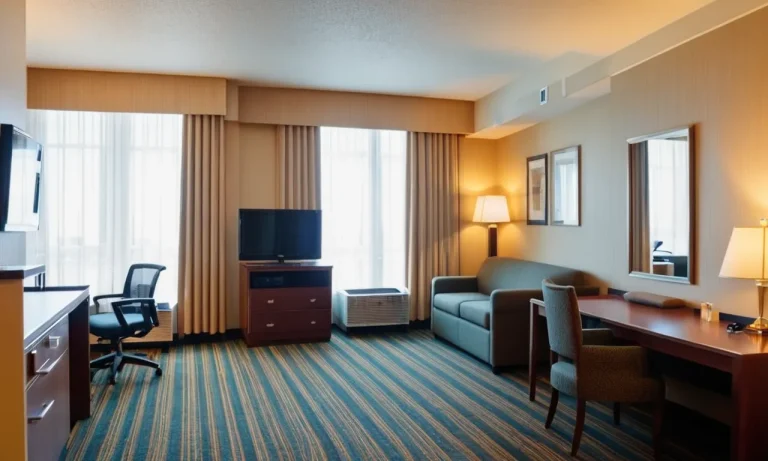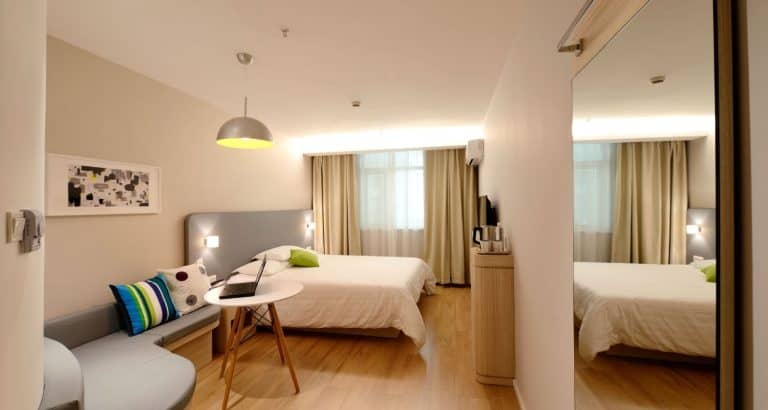Is It Illegal to Live in a Hotel? A Comprehensive Guide
Have you ever found yourself in a situation where you need a temporary living arrangement, and the idea of staying in a hotel for an extended period crossed your mind? While hotels are designed for short-term stays, some individuals may consider living in one for various reasons.
However, the legality of this practice can be a complex issue, and it’s essential to understand the potential implications.
If you’re short on time, here’s a quick answer to your question: Living in a hotel for an extended period is generally legal, but it may be subject to certain restrictions and regulations depending on the location and the specific hotel’s policies.
In this comprehensive article, we’ll delve into the nuances of living in a hotel, exploring the legal considerations, potential challenges, and practical aspects you should be aware of. We’ll cover topics such as zoning laws, hotel policies, tax implications, and alternative housing options, providing you with a well-rounded understanding of this unique living situation.
Legal Considerations for Living in a Hotel
Staying in a hotel for an extended period can be a convenient and flexible living arrangement, but it’s important to understand the legal considerations involved. The laws and regulations surrounding long-term hotel stays can vary depending on the location, so it’s crucial to familiarize yourself with the specific rules and guidelines in your area.
Zoning Laws and Regulations
Many cities and municipalities have zoning laws that regulate the use of properties, including hotels. These laws often define what constitutes a residential or commercial area, and they may place restrictions on the length of time a person can stay in a hotel within a certain zone.
For example, some areas may prohibit individuals from living in a hotel for more than 30 consecutive days, while others may have more lenient or stricter rules.
It’s essential to check with your local zoning office or city hall to understand the specific regulations in your area. Failure to comply with zoning laws could result in fines or even eviction from the hotel.
According to a report by Governing.com, approximately 60% of U.S. cities have zoning laws that limit the length of hotel stays.
Hotel Policies and Guest Agreements
In addition to local laws, hotels themselves may have policies and guest agreements that govern long-term stays. These policies can vary widely from one hotel to another, so it’s crucial to carefully review the terms and conditions before booking an extended stay.
Some hotels may have strict rules about the maximum length of stay allowed, while others may be more flexible. Additionally, hotels may have specific policies regarding amenities, services, and fees for long-term guests.
For instance, some hotels may charge higher rates or require a security deposit for extended stays.
It’s a good idea to have an open conversation with the hotel staff about your intended length of stay and ensure that you fully understand and agree to their policies. Violating these policies could potentially lead to termination of your stay or legal action.
Tax Implications for Long-Term Stays
Living in a hotel for an extended period may also have tax implications that you should be aware of. In some cases, long-term hotel stays may be considered a form of residential accommodation, which could be subject to different tax rules than a typical short-term hotel stay.
For example, in the United States, if you stay in a hotel for more than 30 consecutive days, you may be required to pay local occupancy taxes or other taxes that are typically applied to residential rentals.
Additionally, if you are working remotely or conducting business activities from the hotel, there may be tax implications related to your income or business expenses.
It’s highly recommended to consult with a tax professional or accountant to understand the specific tax implications of your long-term hotel stay and ensure that you are complying with all relevant tax laws and regulations.
Potential Challenges of Living in a Hotel
Limited Living Space and Amenities
While hotels offer a comfortable and convenient lodging experience, they are primarily designed for short-term stays. Living in a hotel for an extended period can pose challenges in terms of limited living space and amenities.
Hotel rooms are typically compact, with minimal storage space and a lack of essential appliances like a full kitchen or laundry facilities. This can make daily living tasks, such as cooking meals or doing laundry, more difficult and inconvenient.
According to a survey by Statista, 75% of travelers consider in-room amenities like a kitchenette or a refrigerator as important factors when choosing accommodations. For long-term stays, the absence of these amenities can significantly impact one’s quality of life and daily routine.
Lack of Privacy and Noise Concerns
Hotels are bustling environments with a constant flow of guests, staff, and visitors. This can lead to a lack of privacy and potential noise disturbances, which can be challenging for those living in a hotel for an extended period.
Thin walls, shared hallways, and common areas can amplify noise levels, making it difficult to find peace and quiet, especially during peak hours or when events are taking place on the premises.
A study by The Soundproofing Company found that 60% of hotel guests experience noise disturbances during their stay, with the most common sources being other guests, staff, and external noise from traffic or construction.
This highlights the importance of privacy and noise reduction for those considering long-term hotel living.
Costs and Budgeting for Extended Stays
While hotels can offer convenience and amenities, the costs associated with extended stays can be substantial. Hotels are typically priced for short-term visits, and rates can quickly add up, especially in popular tourist destinations or urban areas.
Additionally, the lack of kitchen facilities may lead to increased expenses for dining out or ordering room service, further straining one’s budget.
According to ValuePenguin, the average cost of living in a hotel for a month ranges from $3,000 to $5,000, depending on the location and hotel rating. This figure can be even higher in major cities like New York or San Francisco.
Careful budgeting and financial planning are crucial for those considering long-term hotel living to ensure they can sustain the costs without compromising their financial stability.
While living in a hotel can offer convenience and flexibility, it’s essential to weigh the potential challenges, such as limited living space, lack of privacy, noise concerns, and the costs associated with extended stays.
By understanding these factors, individuals can make informed decisions and explore alternative long-term housing options that better suit their needs and lifestyle.
Practical Aspects of Living in a Hotel
Establishing a Routine and Adapting to Hotel Living
Living in a hotel can be a unique and exciting experience, but it also requires adapting to a new environment and establishing a routine. One of the first steps is to create a sense of familiarity by unpacking your belongings and arranging your room in a way that feels comfortable and organized.
This can help you feel more at home and make the transition smoother. Additionally, it’s essential to establish a routine that mimics your regular schedule as much as possible. This might include setting specific times for meals, work, exercise, and leisure activities.
Adapting to hotel living also involves embracing the amenities and services available to you. Many hotels offer on-site laundry facilities, fitness centers, and even complimentary breakfast or happy hour events.
Utilizing these amenities can not only make your stay more convenient but also provide opportunities for socializing and building a sense of community. According to a study by Hotel News Resource, over 60% of long-term hotel guests cite access to amenities as a major factor in their decision to stay at a particular property.
Maintaining a Healthy Lifestyle in a Hotel Environment
While living in a hotel can be convenient, it’s crucial to prioritize your health and well-being. One of the challenges of hotel living is the temptation to indulge in unhealthy habits, such as relying on room service or neglecting exercise routines.
To combat this, consider packing a small cooler with healthy snacks and drinks, or taking advantage of the hotel’s kitchen facilities, if available. 😊 Many hotels also offer in-room fitness equipment or discounted access to nearby gyms, making it easier to maintain an active lifestyle.
Additionally, be mindful of your sleep patterns and create a sleep-friendly environment in your room. This might involve using blackout curtains, a white noise machine, or investing in a comfortable mattress topper.
According to the Centers for Disease Control and Prevention, adults need 7-9 hours of quality sleep per night for optimal health and well-being. By prioritizing rest and relaxation, you can avoid burnout and maintain a positive mindset during your hotel stay.
Building a Sense of Community and Social Connections
One of the potential downsides of living in a hotel is the risk of feeling isolated or disconnected from a larger community. However, there are several ways to combat this and build meaningful social connections.
First, take advantage of any community events or gatherings hosted by the hotel, such as happy hours, movie nights, or game nights. These provide excellent opportunities to meet fellow guests and strike up conversations.
Additionally, consider joining local clubs, organizations, or online communities related to your interests or hobbies. This can help you establish a social circle beyond the hotel walls and provide a sense of belonging.
According to a study by Psychology Today, strong social connections are essential for mental and emotional well-being, as well as overall life satisfaction.
Lastly, don’t be afraid to strike up conversations with hotel staff or other guests in common areas. A friendly smile and a simple “Hello” can go a long way in building connections and creating a sense of community within your temporary living space.
👏 With a bit of effort and an open mindset, living in a hotel can be a rewarding and socially enriching experience.
Alternative Housing Options to Consider
Short-Term Rentals and Vacation Homes
If you’re looking for a temporary housing solution that offers more space and privacy than a hotel room, short-term rentals and vacation homes can be an excellent alternative. Platforms like Airbnb, VRBO, and HomeAway have revolutionized the way people find and book accommodations, offering a wide variety of options from cozy apartments to luxurious villas.
According to Statista, Airbnb’s global revenue reached a staggering $6.8 billion in 2022, highlighting the growing popularity of this alternative housing option. 😎
Short-term rentals can be a fantastic choice for families, groups of friends, or anyone seeking a more home-like experience during their stay. You’ll have access to a full kitchen, living areas, and often multiple bedrooms, which can be especially convenient for longer stays or when traveling with children.
Plus, many hosts go the extra mile to provide local tips and recommendations, making you feel like a true local. 👏
Extended Stay Hotels and Serviced Apartments
If you’re looking for a blend of hotel amenities and residential comforts, extended stay hotels and serviced apartments might be the perfect fit. These accommodations are designed with longer stays in mind, typically offering fully equipped kitchens, separate living and sleeping areas, and on-site laundry facilities.
According to Statista, Extended Stay America is the largest extended stay hotel chain in the United States, with over 600 properties as of 2022.
Extended stay hotels and serviced apartments can be a great option for business travelers, corporate housing needs, or anyone requiring a temporary home-away-from-home. Many of these properties offer weekly or monthly rates, making them a more cost-effective choice for longer stays compared to traditional hotels.
Additionally, you’ll enjoy the convenience of hotel-like services, such as housekeeping and on-site amenities, while still having the privacy and space of a residential unit. 😍
Transitional Housing and Temporary Shelters
For those facing more challenging circumstances, transitional housing and temporary shelters can provide a vital safety net. These housing options are typically offered by non-profit organizations, religious groups, or government agencies and are designed to provide temporary accommodation and support services for individuals or families in need.
Transitional housing programs can assist individuals or families who are homeless, recently released from incarceration, or fleeing domestic violence situations. These programs often provide case management, counseling, job training, and other support services to help residents achieve self-sufficiency and transition into permanent housing.
According to SAMHSA, transitional housing programs can last anywhere from a few months to two years, depending on the specific program and the needs of the residents.
Temporary shelters, on the other hand, provide emergency accommodation for individuals or families facing homelessness or other crisis situations. These shelters typically offer basic necessities such as food, clothing, and a safe place to sleep, as well as referrals to other support services.
While temporary shelters are not intended for long-term living, they can provide a crucial lifeline for those in need.
It’s important to note that eligibility requirements and availability for transitional housing and temporary shelters can vary greatly depending on the specific program and location. If you or someone you know is in need of these services, it’s recommended to reach out to local organizations or government agencies for more information and assistance.
Making an Informed Decision
Weighing the Pros and Cons of Hotel Living
Before deciding to live in a hotel long-term, it’s crucial to weigh the pros and cons carefully. On the plus side, hotel living offers convenience, amenities, and a hassle-free lifestyle. You don’t have to worry about maintenance, utility bills, or cleaning – it’s all taken care of for you.
Additionally, many hotels provide perks like room service, pools, gyms, and sometimes even free breakfast. 😍 However, the downside is that hotel living can be expensive in the long run, and you may feel a lack of privacy or personal space.
It’s also important to check if your intended hotel allows long-term stays and what the policies are.
Seeking Professional Advice and Guidance
When considering a long-term hotel stay, it’s wise to seek professional advice and guidance. Consult with a real estate lawyer or a housing expert to understand the legal implications and potential risks involved.
They can provide valuable insights into local laws, zoning regulations, and tenant rights. Additionally, speaking with a financial advisor can help you assess the long-term costs and budgeting requirements for hotel living.
Websites like Nolo.com offer comprehensive information on tenant rights and legal considerations.
Planning for the Future and Long-Term Housing Solutions
While hotel living may be a temporary solution, it’s important to consider long-term housing options as well. If you plan to stay in a hotel for an extended period, make sure to explore alternative housing solutions that may be more cost-effective and provide a sense of permanence.
This could include renting an apartment, purchasing a home, or exploring co-living spaces. According to a study by ApartmentList.com, the national median rent for a one-bedroom apartment in the US is $1,098 as of 2023.
👏 By comparing costs and weighing your options, you can make an informed decision that aligns with your long-term goals and financial situation.
Remember, the decision to live in a hotel long-term should not be taken lightly. It’s crucial to understand the legal implications, weigh the pros and cons, seek professional advice, and plan for the future.
With careful consideration and proper planning, you can make the best choice for your unique circumstances.
Conclusion
Living in a hotel can be a viable option for those seeking temporary housing, but it’s crucial to understand the legal implications, potential challenges, and practical considerations involved. By exploring zoning laws, hotel policies, tax implications, and alternative housing options, you can make an informed decision that aligns with your needs and circumstances.
Ultimately, the decision to live in a hotel should be carefully weighed, taking into account factors such as cost, privacy, amenities, and long-term goals. Seeking professional advice and guidance can help you navigate this unique living situation and ensure compliance with relevant regulations.
Remember, while living in a hotel may provide a temporary solution, it’s essential to have a plan for securing more permanent and sustainable housing in the future. By considering all aspects of hotel living, you can make the best choice for your specific situation and ensure a comfortable and legally compliant living experience.







